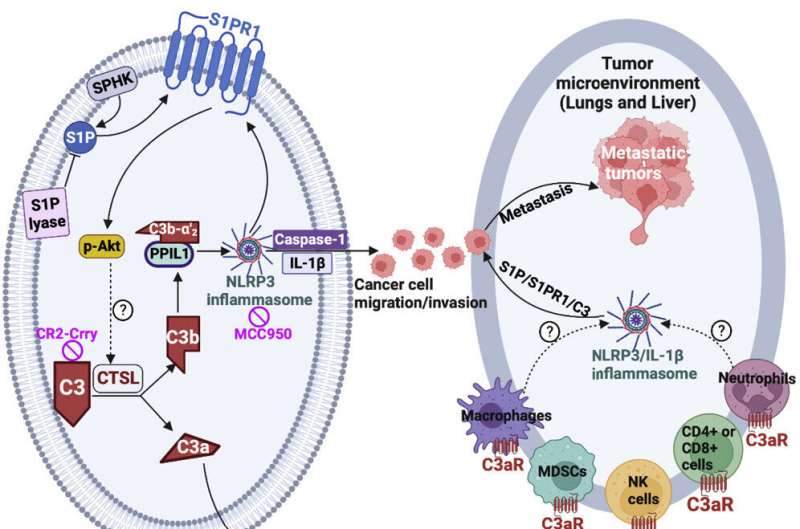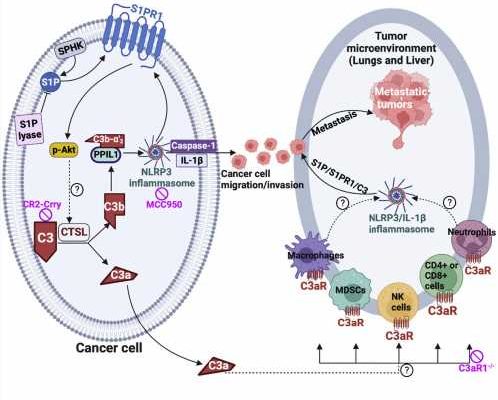
MUSC Hollings Cancer Center researchers have identified the sequence of molecular interactions that could be key to stopping the spread of cancer cells. Currently, there is no reliable therapeutic approach to prevent metastasis, the leading cause of death from solid cancerous tumors. Published in Cell Reports, this work is the first to uncover the link between two important groups of molecules that regulate cell-to-cell communication within tumors to increase cancer cell migration and metastasis.
The complexity of cancer causes many challenges for researchers, oncologists and patients. “Cancer is not a single cell, single protein or single treatment disease. It is a complex process, which is why there is still so much that we do not understand. Cancer metastasis is the cause of approximately 90% of all cancer death, and the challenge is that we still do not understand the biological mechanisms that cause metastasis,” said Besim Ogretmen, Ph.D., the SmartState Endowed Chair in Lipidomics and Drug Discovery.
To develop novel treatment approaches against cancer, Ogretmen’s laboratory studies how sphingolipids, a class of fatty molecules, function in cancer cells. Sphingosine-1-phosphate (S1P) is the central lipid in most sphingolipid chemical reactions. Ogretmen, an expert in sphingolipid biology, has published multiple studies demonstrating the functions of S1P in cancer development and progression.
The idea that led to this novel discovery was developed during a casual brainstorming discussion with colleague Carl Atkinson, Ph.D., a former researcher at MUSC and an expert in the field of complement biology.
“Sphingolipid signaling and complement signaling have similarities and both function in cancer. We asked each other whether we could see if there is any crosstalk between sphingolipid signaling and complement signaling, and we didn’t find anything in the literature. This led to us starting this project to answer the currently unanswered questions,” Ogretmen said.
The complement system is a part of the immune system that can destroy pathogens and helps the body to heal after an injury or infection. However, research from the past five years has revealed that some tumors can turn on the complement system, resulting in improved tumor cell survival and metastasis.
Understanding the back-and-forth communication between biological systems, not just single molecules, is the future of understanding cancer and improving therapies because biological systems within the body are intertwined. Ogretmen’s group, with the close collaborations of Atkinson and Hollings researcher Stephen Tomlinson, Ph.D., a professor of microbiology and immunology and complement expert, aimed to understand how two critical systems—S1P and complement—are linked and how they coordinate cancer metastasis. While most researchers look at a single cancer type, this work is unique because the findings apply to many types of solid tumors.
Through a series of elegant experiments, the researchers demonstrated a new biological mechanism that regulates how cancer cells talk to each other to develop a more aggressive cancer. High levels of S1P inside the cancer cells activate a complement molecule called C3, leading to the formation of an inflammation-promoting complex called the inflammasome. This sequence of events and inflammasome activity drive the spread of cancer cells.
This study was the first to show that the C3 molecule can be activated inside cancer cells. “This work is a big deal in terms of what can be gained from it in the future. We showed new binding and introduced new concepts that can be used to develop new therapies,” Ogretmen said.
To ensure that this finding was relevant in human cancer, they first looked at tissue samples from patients with metastatic breast cancer. They found that levels of the key molecules, such as C3 and inflammasome markers, were higher in the cancerous tissue than in normal breast tissue. More broadly, The Cancer Genome Atlas (TCGA) database showed that higher-than-normal levels of the key molecules are associated with poor survival of patients in most types of solid tumors.
“The TCGA database results support the clinical relevance of the link that we found between sphingolipids and complement signaling,” said Alhaji (AJ) Janneh, a graduate student in Ogretmen’s lab and lead author on this publication. “If you can really understand the signaling mechanisms that make a tumor metastasize, then it is more easily treated. As we gain more understanding, I think we’ll have better solutions to stop cancer metastasis.”
Janneh moved to the U.S. from Sierra Leone in 2012 to follow his passion for discovery. “I always want to know the answers to everything. That’s what drives me to science—I want to find out the problem and try to solve it. One of the reasons why I joined Ogretmen’s lab was because of the freedom that you have for expressing your curiosity and testing your ideas in the lab. Ogretmen does an excellent job of allowing us to think for ourselves and implement our ideas,” Janneh said.
Ogretmen has mentored over 20 graduate students at MUSC, which he said has been very rewarding. “When graduate students first come in, they’re logically not as skilled as some experienced postdocs or research fellows. There is a huge development for students, as a person as well as a scientist, that is very noticeable over the course of their training. My goal is to show them how a professional research lab should work, and my hope is that I can teach them good lab culture so they can continue to contribute to science as independent researchers,” Ogretmen said.
Ogretmen’s experience and Janneh’s drive allowed them to discover that blocking different parts of the metastasis-promoting S1P-C3 system with chemical inhibitors can reduce metastasis in a mouse model of aggressive melanoma. They continue to test different inhibitors, sometimes in combination with immunotherapies, to determine the best way to inhibit metastasis across multiple types of solid tumors. “Many of the inhibitors we are testing are commercially available for other diseases, such as multiple sclerosis. This treatment approach is unique in cancer, as we are combining existing inhibitors in a new way to stop metastasis,” Ogretmen said.
The research team is already working on its next publication, which takes a deeper dive into the precise mechanisms of how the inflammasome complex is activated. Understanding how this process occurs at the molecular level will give the team more ideas on targeting this very intricate mechanism involving many different metabolic and signaling molecules. These ongoing studies will provide a wealth of knowledge about the biology behind tumor-cell metastasis and inform future treatment strategies.
More information:
Alhaji H. Janneh et al, Crosstalk between pro-survival sphingolipid metabolism and complement signaling induces inflammasome-mediated tumor metastasis, Cell Reports (2022). DOI: 10.1016/j.celrep.2022.111742
Journal information:
Cell Reports
Source: Read Full Article
